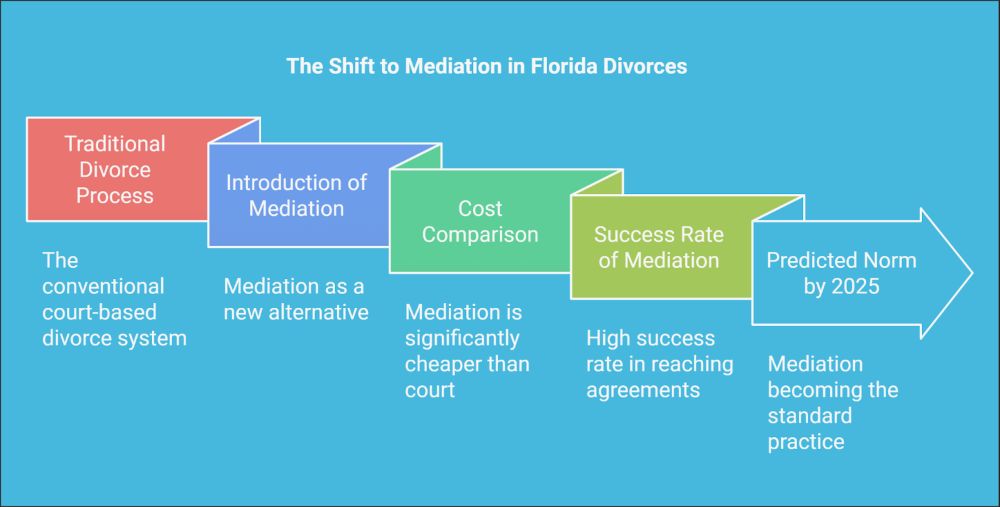
The Future of Divorce in Florida: Why Mediation Will Be the Norm by 2025

What if I told you that by 2025, most divorces in Florida might not involve a single day in court?
Imagine a world where divorces don’t have to be messy, expensive battles. That’s the future we’re heading toward in Florida, and it’s all thanks to something called mediation.
Mediation is like having a friendly referee help you and your ex-partner make decisions together. It’s cheaper, faster, and way less stressful than going to court. In fact, mediation typically costs between $3,000 and $8,000 total, while a regular divorce can cost up to $30,000 per person!
Plus, it works well. Almost 90% of couples who try mediation end up reaching an agreement. That’s why professionals think that by 2025, most people getting divorced in Florida will choose mediation instead of going to court.
This trend toward mediation is driven by several factors. These include its cost-effectiveness, faster resolution times, and the opportunity for couples to have more control over the outcome.
Divorce mediation in Florida allows couples to work with a neutral third party to reach agreements on important issues like property division, child custody, and financial support.
Given the growing popularity and recognized benefits of mediation, it’s likely to become the norm for divorce proceedings in Florida by 2025.
This shift promises to reduce divorce’s emotional and financial toll while promoting more amicable resolutions for families in transition.
Key Takeaways
- Mediation offers a faster and more cost-effective way to resolve divorce disputes.
- Couples have more control over the outcome in mediation compared to traditional litigation.
- The shift towards mediation can lead to less adversarial and more cooperative divorce resolutions.
The Current State of Divorce in Florida

Florida’s divorce landscape is changing. Divorce rates are shifting, and the traditional litigation process is facing challenges. These changes significantly affect families and the economy.
Statistics on Divorce Rates in Florida
Florida’s divorce rate is 3.4 per 1,000 residents, placing it among the top ten states for divorce rates nationwide. However, this rate has been declining in recent years, following a national trend.
From 2011 to 2021, Florida saw a 24.4% decrease in divorce rates. This drop mirrors the national pattern, where rates fell from 9.7 to 6.9 divorces per 1,000 women over the same period.
Ethnic composition plays a role in divorce rates. For example, the American Indian population in Florida has the highest divorce rate despite being a small group.
Traditional Litigation Process and Its Drawbacks
The traditional divorce litigation process in Florida can be time-consuming and expensive. It often involves:
- Long court proceedings
- High attorney fees
- Emotional stress for all parties involved
This adversarial approach can worsen conflicts between spouses. It may lead to:
- Increased animosity
- Difficulty in co-parenting
- Negative impacts on children’s well-being
The process can drag on for months or even years, delaying closure for families trying to move forward.
Economic Impact of Divorce on Individuals and Families
Divorce in Florida can have significant financial consequences. It often results in:
- Decreased household income
- Division of assets and debts
- Potential loss of health insurance for one spouse
Child support and alimony payments can strain budgets. Many divorced individuals face the following:
- Increased living expenses
- Challenges in maintaining their standard of living
- Difficulties in saving for retirement
The economic impact extends beyond immediate finances. It can affect long-term financial stability and retirement plans for both parties involved.
The Rise of Mediation in Florida

Mediation has become a popular choice for couples seeking divorce in Florida. This method offers a more peaceful and cost-effective approach to ending a marriage.
Definition and Explanation of Divorce Mediation
Divorce mediation in Florida involves a neutral third party helping couples reach agreements on divorce-related issues. The mediator doesn’t make decisions but guides the conversation.
This approach allows couples to work together to find solutions that benefit both parties. It covers property division, child custody, and financial matters.
Mediation sessions are private and confidential. This helps create a safe space for open discussions.
Benefits of Mediation Over Litigation
Mediation offers many advantages compared to going to court. It’s often faster and less expensive than a traditional divorce trial.
Florida divorce mediation gives couples more control over the outcome. They can create custom solutions that fit their unique situation.
The process is less stressful and more flexible than court proceedings. It can help preserve relationships, especially when children are involved.
Mediation often leads to better agreement compliance since both parties have a hand in creating them.
Current Trends in Mediation Usage in Florida
Florida law requires mediation in most divorce cases before going to trial. This has led to a rise in its use across the state.
More couples are choosing mediation as their first option. They see it as a way to avoid long, costly court battles.
Many Florida courts now offer mediation services. This makes it easier for couples to access this helpful resource.
The trend toward mediation is expected to continue growing. It aligns with the desire for more peaceful divorce options and amicable divorce solutions.
Feeling overwhelmed by the thought of a courtroom battle? Peacemaker Mediation Group understands the emotional toll of divorce. Let us guide you through child custody mediation with compassion and clarity. Set Up Your Free Consultation.
If you’re ready to get started, call us now!
Why Mediation Will Become the Norm by 2025
Divorce mediation is poised to become the standard approach in Florida by 2025. This shift will be driven by changing attitudes, growing awareness of benefits, technological progress, legal reforms, and economic factors.
Changing Societal Attitudes Towards Divorce
People’s views on divorce are evolving. The stigma is fading as more couples seek amicable separations. This change supports mediation as a less adversarial option.
Couples increasingly prioritize:
- Maintaining positive co-parenting relationships
- Preserving family harmony
- Reducing emotional stress on children
Mediation aligns with these goals by fostering communication and cooperation. It allows couples to work together to find mutually agreeable solutions.
Increased Awareness of Mediation Benefits
More people are learning about the advantages of mediation. These include:
- Lower costs than litigation
- Faster resolution times
- Greater privacy and confidentiality
- More control over the outcome
Mediators with therapy backgrounds are especially skilled at helping couples navigate emotions. They can guide discussions to focus on future-oriented solutions rather than past grievances.
As success stories spread, more couples will likely choose mediation. This positive word-of-mouth will fuel its growth as the preferred option.
Technological Advancements Facilitating Online Mediation
Digital tools are making mediation more accessible and convenient. Online platforms allow couples to:
- Participate in sessions from home
- Schedule meetings around work and family commitments
- Share documents securely
- Communicate asynchronously between sessions
Video conferencing enhances remote mediation by facilitating screen sharing, which allows for the visualization of financial data and proposed agreements.
These technologies will continue to evolve, making online mediation even more user-friendly and effective. This accessibility will drive wider adoption of mediation services.
Legal Reforms Promoting Alternative Dispute Resolution
Florida’s legal system is increasingly encouraging mediation in divorce cases. Courts recognize its benefits, such as reducing caseloads and improving outcomes.
Potential reforms may include:
- Mandatory mediation attempts before litigation
- Streamlined processes for mediated agreements
- Incentives for couples choosing mediation
These changes will encourage more couples to choose mediation as their first choice and smooth the process for those who opt for it.
Economic Factors Driving the Shift Towards Mediation
Financial considerations will play a big role in mediation’s growth. Mediation is typically much less expensive than going to court.
Average costs:
- Mediation: $3,000 – $8,000
- Litigation: $15,000 – $30,000+
In tough economic times, couples will seek cost-effective options. Mediation allows them to save money for post-divorce needs.
Businesses are also starting to offer mediation as an employee benefit. This trend will likely grow, making mediation even more accessible to divorcing couples.
Are legal fees and endless disputes adding to your stress? Peacemaker Mediation Group provides a calmer, cost-effective path with uncontested divorce mediation, helping you reclaim control and focus on a peaceful future. Contact us now!
If you’re ready to get started, call us now!
The Impact of Widespread Mediation Adoption
Mediation is changing how couples handle divorce in Florida. This shift has many positive effects on families, courts, and communities.
Reduced Burden on the Court System
Divorce mediation helps ease the load on Florida’s busy courts. When more couples choose mediation, fewer cases go to trial.
This means shorter wait times for court dates, and judges can focus on complex cases that really need their attention.
Court staff also benefit. They spend less time on paperwork and scheduling for divorce cases.
Mediation often wraps up faster than court battles. This quick resolution keeps the system moving smoothly.
Improved Post-Divorce Relationships and Co-Parenting
Mediation helps ex-spouses communicate better. They learn to work together during the process.
This skill carries over after the divorce. Parents find it easier to make decisions about their kids.
Co-parenting after mediation tends to be more peaceful. Kids benefit when their parents can talk without fighting.
After mediation, couples often feel less anger toward each other, which can lead to friendlier family events like graduations or weddings.
Mediation teaches problem-solving skills. These help in future disagreements, too.
Financial Benefits for Divorcing Couples
Mediation is often cheaper than going to court. Couples can save thousands on lawyer fees.
The process is quicker, which means less time off work. This helps protect incomes during a tough time.
Mediators help couples find fair ways to divide assets, which can lead to better financial outcomes for both parties.
Cost-effective divorce in St. Augustine and other Florida cities becomes more common with mediation.
Couples can avoid the surprise costs that often come with court battles. Mediation fees are usually clear from the start.
Positive Effects on Children of Divorcing Parents
Kids suffer less stress when their parents use mediation. They see less conflict between mom and dad.
Children feel more secure when parents work together. This helps them adjust to the new family situation.
Mediation often leads to better custody arrangements. Parents focus on what’s best for the kids, not winning against each other.
Kids whose parents mediate often have better relationships with both parents after divorce. They don’t feel forced to take sides.
The emotional aspects of mediated divorce are usually less intense for children. This can help protect their mental health long-term.
How to Prepare for a Mediated Divorce
Getting ready for divorce mediation involves several key steps. Proper preparation can lead to better outcomes and a smoother process for both parties.
Steps to Take Before Entering Mediation
Start by gathering all important financial documents. This includes bank statements, tax returns, and property records.
Make a list of assets and debts to share with your mediator.
Next, think about your goals for the divorce. What matters most to you? Is it child custody, property division, or financial support?
Write these down to help focus your discussions.
Consider working with a lawyer to understand your rights. Many people in St. Augustine use mediation services that allow attorney consultations.
This can help you feel more confident during talks.
Lastly, try to keep an open mind. Mediation works best when both sides are willing to compromise.
What to Expect During the Mediation Process
Mediation usually starts with an introduction by the mediator. They will explain the process and set ground rules.
In St. Augustine, mediators like Joni Mathis often begin this way.
The mediator then allows both parties to share their views, helping keep the talks peaceful and on track.
They don’t make decisions but help couples find common ground.
Expect to discuss all aspects of your divorce, including splitting assets and debts and making plans for children if you have them.
The process may take several sessions. Be patient and stay focused on solutions.
Tips for Successful Mediation Outcomes
Stay calm and respectful during talks. This helps create a positive atmosphere for problem-solving.
Remember, the goal is to find fair solutions for both sides.
Be honest about your finances and needs. Hiding information can lead to problems later and may harm trust.
Listen carefully to your ex-spouse’s concerns. Understanding their point of view can lead to better compromises.
Don’t be afraid to take breaks if emotions run high. Peacemaker Mediation Group often suggests this to help people focus on the future, not past hurts.
Keep an open mind about different options. Sometimes, creative solutions can satisfy both parties’ needs.
Conclusion
Divorce mediation in Florida is set to become the standard approach by 2025. This shift reflects a growing desire for more peaceful and cost-effective resolutions to marital separations.
Couples are increasingly recognizing the benefits of mediation. It is less adversarial and allows for more control over the outcome.
Mediation can be faster and less expensive than traditional litigation. Florida’s legal system is adapting to support this trend. The state already requires mediation in most divorce cases before proceeding to trial.
This requirement will likely expand and become more comprehensive in the coming years.
As more couples choose mediation, the stigma around divorce may lessen. The focus will shift towards finding mutually beneficial solutions rather than “winning” against a spouse.
Mediators will play an increasingly important role in Florida’s divorce landscape. They will help couples navigate complex issues and reach fair agreements.
The future of divorce in Florida looks more collaborative and less contentious. Mediation offers a path forward that prioritizes communication, understanding, and cooperative problem-solving.
Are you tired of the emotional strain and financial drain of traditional divorce? Peacemaker Mediation Group is here to support you with contested divorce mediation. Find closure, fairness, and a way forward—on your terms.
Contact Us Today For An Appointment
Frequently Asked Questions
What are the benefits of choosing mediation over litigation in Florida divorce cases?
Mediation can save couples time and money compared to going to court. It allows spouses to work together to find solutions for their unique situation.
Mediation often costs between $2,000 to $8,000, much less than litigation.
Mediation allows couples to maintain more privacy. Court proceedings become public records, while mediation discussions stay confidential. This process can also reduce stress and conflict between spouses.
Can you explain the process of divorce mediation in Florida?
A neutral mediator guides couples through discussing and resolving divorce-related issues. Topics may include property division, alimony, child custody, and support.
The mediator doesn’t make decisions but helps spouses communicate and find common ground.
Mediation sessions typically last a few hours. Some cases can be resolved in one session, while others require multiple meetings.
Once an agreement is reached, the mediator drafts a settlement for review by each spouse’s attorney.
Can I opt out of mediation and proceed directly to court in a Florida divorce?
Florida law requires most divorcing couples to attempt mediation before going to court. However, exceptions exist in certain situations.
Cases involving domestic violence or when one spouse cannot participate meaningfully may bypass mediation.
Couples can also choose to litigate if mediation fails to produce an agreement. A judge will then make final decisions on unresolved issues.
How might mediation impact the cost and duration of a divorce proceeding in Florida?
Mediation often reduces both the cost and time needed to finalize a divorce. Litigation can exceed $20,000 per person, while mediation usually costs much less.
The collaborative nature of mediation can lead to faster resolutions.
Mediated divorces may conclude in weeks or months. Court battles can drag on for a year or more. Faster resolutions mean couples can move forward with their lives sooner.
What role do attorneys play in the mediation process for divorces in Florida?
Attorneys can advise clients before, during, and after mediation sessions. They help spouses understand their rights and options.
Lawyers review agreements to ensure fairness and legality.
Some couples choose to mediate without attorneys present. Others prefer to have lawyers attend sessions.
Florida law allows flexibility in attorney involvement during mediation.
How can couples prepare for a successful mediation in a Florida divorce scenario?
Spouses should gather financial documents. Then, they should make lists of assets and debts.
They should also consider their priorities and be ready to compromise. Open communication and willingness to listen are crucial.
Focusing on the future rather than past grievances can help move mediation forward. Couples should approach mediation with a problem-solving mindset. Being prepared and flexible increases the chances of reaching a mutually satisfactory agreement.




